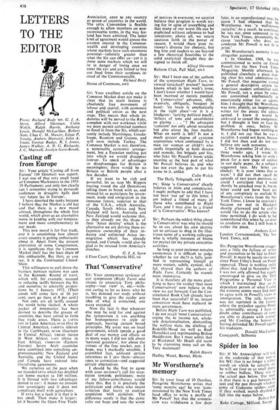Mr Worsthorne's memory
Sir: In your issue of 10 October, Peregrine Worsthorne writes that 'some months ago' he was 'com- missioned by the New York Times head office to write a profile of Mr Powell' but that the commis- sion was withdrawn a few, days later, in an unprofessional way, be- cause I had objected that Mr Worsthorne was 'a well-known racialist.' As a result, he continues, he has not since appeared in the New York Times, presumably be. cause 'anybody who does not condemn Mr Powell is not fit to print: Mr Worsthorne's memory is not altogether accurate.
1. In October, 1968, he was commissioned to write on Enoch Powell for the New York Times Magazine. Shortly afterward, he published elsewhere a piece mak- ing clear his total admiration for Mr Powell. Our magazine wanted a general descriptive article for American readers unfamiliar with Mr Powell, not a piece by some- one committed intellectually or emotionally either for or against him. I thought that Mr Worsthorne was now, plainly, an inappropriate writer for the piece; the editors agreed. I knew it would be awkward to cancel the assignment, but I thought it best to face the problem at once, before Mr Worsthorne had begun working on it. I did not say that he was a racialist. I could not have, because I did not then and do not now believe any such nonsense.
2. On September 24 of this year. three weeks ago, I wrote Mr Worsthorne asking him to write a piece for a new page of opinion in our daily paper. As a subject I suggested race. My. letter con- cluded: 'It is your views that we want.' I did not then recall the episode of two years previous, nor could I anticipate that I would shortly be attacked over it, but my letter could not have been pars of any conspiracy to exclude Mr Worsthorne's views from the New York Times. I know he received it. because we met in Blackpool shortly afterward and he said he would like to do the article when time permitted. I do wish he had remembered this when he sat down to condemn us. But I still hope he writes the piece.
A nthonv Lewis London Correspondent, The New York Times, sc4 Sir: Peregrine Worsthorne exagger- ates a little the failure of writers and journalists to be fair to Enoch Powell. It must be nearly two years since Peter Utley's book on Powell appeared. There is nothing unfair about that. And in November 1968 1 was not only allowed but eager]) encouraged to give on the Third Programme a 'Personal View' in in- dependent I maintained that an person of what I called the extreme centre must find much to agree with in Powell's views on immigration. The talk, however. was not reprinted in the Listener where the prejudice against Powell is, admittedly, strong. I have 110 doubt other contributors of yours are able to dispute with yourself and Mr Cowling the honour of having defended Mr Powell against
his traducers. Donald MacLachlen Coneycroft, Selborne






































 Previous page
Previous page